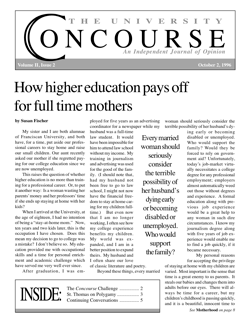The challenge of the Concourse: discussion without (much) contention
by Kathleen van Schaijik
The last two weeks have seen something of a shake-down and re-grouping in the cyberspace headquarters of the Concourse editorial board.
When the managing editor and the editor-in-chief blithely picked up and moved overseas, we knew there would be adjustments to make, but we had not fully accounted for the abysmal difference between the face-to-face deliberations of regular board meetings and the (relatively) clumsy and incomplete communication of the internet. Nor had we anticipated how many toilsome practical hurdles would have to cleared before we were off and running smoothly.
In trying to reorganize our operations, re-define our various functions, and concentrate our energies, I have had much reflecting and articulating to do about our specific “vision” for the Concourse and its place at the University. It was essential to clarify this, if we were to be able to answer in the affirmative the question that has (I imagine) stealed at times into all our minds: “Is it worth the cost?”
We can give a great deal only for what we perceive is worth a great deal.
If our journal were to be nothing more than your average, run-of-the-mill, college-paper opinion-page, I for one, would not bother with it. I am dedicated to the Concourse because I see as something more than this—something more valuable, more vital and more wholesome—as different from your typical college journal as Franciscan University is from your typical college. Its pages are meant to reflect her nature; to partake in her unique ethos of profound faith, humble plainness and evangelical zeal.
Still, all our noble aims notwithstanding, we have been intensely aware lately of how easily the journal might devolve into something we do not want: a sort of academic gripe sheet; a place where intellectuals with axes to grind or chips on their shoulders could test their rhetorical mettle against their opponents—real or imaginary. We cannot let this happen.
The fixed purpose of the Concourse is to provide a forum where we can cooperate with one another in attaining truth; while the inexorable, post-Eden human tendency is to contend with one another in pursuing triumph. Even (perhaps especially) where the topics are important and worth fighting for, it hard to keep civilized discussions from degenerating into unfruitful, bitter verbal combats. And when this happens, our community is no longer steadfastly converging on the whole Truth, but dispersing into warring factions, each hoarding fragments of it.
I mean do what I can in my capacity as editor to resist this destructive tendency. I ask the same of you who read and respond to the articles printed here. The goal is not first of all to win arguments or to display profundity and cleverness, but to help each other better realize “whatever is true.”
Still, there are more dangers than one to be avoided in a situation like ours. While we may risk fomenting strife when we publicly highlight our differences; to fail to address them at all is to cultivate apathy, superficiality and unseriousness toward truth—particularly deplorable weaknesses in a university community. In our eagerness to avoid contention, we are sometimes tempted to let sleeping dogs slip into a coma. Then our efforts to “keep the peace” become instead a way of “enabling” each other to lose sight of truth and our duty to “become perfect” as a university.
It was mainly to respond to this threat to our well-bing that the Concourse was brought into being.
Therefore, it should not surprise or disturb us too much to find that tensions occasionally arise around our disputes, that our “tone” is not always perfectly congenial to all parties in a given debate, and that from time to time someone feels a bit threatened by the aggressiveness of a critique of his viewpoint. Better, we think, to allow this than to stifle authentic intellectual exchange, which is essential to our maturing as individuals and as a community. It is part of learning to take each other’s ideas and sensibilities more seriously—which is what the Concourse is all about.
Kathleen van Schaijik


